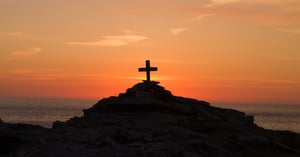Annual observances of Lent seem to have become more profound than ever. That might be an observation caused by my getting older as a member of the Baby Boom generation. But it did not escape my attention when Ash Wednesday in 2020 seemed to usher in the global trauma of Covid or when this year’s time of penitence began as we experienced how tragic and confounding Russia’s invasion of Ukraine would be.
And now I sense an extra level of intensity as if the insights of Lent are coming not only in gentle zephyrs to individual souls but via a megaphone to hordes, even to the human community at large.
Is God using these traditional forty days of prayer, fasting, and almsgiving to comprise a “teachable moment”? One that draws us closer to Him amid human weakness and reliance on His love—to remind us of inconvenient truths? Does God use such moments? I figure He is always calling to us, and full communication simply relies on our participation and readiness to observe the signs of the times, to “harden not our hearts.” The decibel level of His recent calls, which have gone “viral” and have smashed through our digital screens with scenes of war, ought to inspire our responsiveness.
So far, the invasion of Ukraine has helped to kick our practice of almsgiving into high gear via charitable donations. And the practice of fasting has taken on greater relevance as the world considers inflation, fuel use, supply disruptions, and food shortages. What about the third practice of Lenten discipline?
World as Community, World as Confessional
On March 25, the Feast of the Annunciation, Pope Francis led us in prayer at a deep level—a ritual of recollection and confession, along with an appeal for grace and remorse for decades of social and personal sin. As Catholics say at Mass, “I confess” that I have increased our world’s burden of guilt by “what I have done and what I have failed to do.”
Like that liturgical “Confiteor,” this acknowledgment of evil emanated from individual hearts and kindred groups. These groups constituted the whole Body of Christ but also included amalgams such as nationalities or age cohorts. Baby Boomers, for example, knew what they were acknowledging.
The Pope’s appeal for grace took the form of consecrating all nations—and “especially Russia and Ukraine”—to Jesus through Mary. The pontiff made this a global and local act, accompanied by bishops around the world.
All of this struck me as a source of great hope and fraternal solidarity amid the terror of war and the tragedy of social polarization. The Pope’s call to prayer temporarily toppled walls that prevent so many people from transcending their self-sufficiency, tribes of self-imposed identity, and hatred and fear grounded in politics, pride, and power games. Catholics came together in their weakness and need. Nowadays, remorse and humility may be the only paths where throngs find a unified voice.
Focusing on the world’s outreach to God, I was struck by one other remarkable circumstance of connection and recollection. Alongside this glimpse of solidarity transcending borderlines and demographics, I marveled at a whole generation—loosely speaking, “older folks” who belong to a few generations—coming together to make a universal act of confession.
Examination of Conscience and Consciousness
Pope Francis is 85. So many world leaders—I’m especially aware of those in the United States—can be called members of what Americans know as the “Silent Generation” (born between 1925 and 1945) or the Baby Boomers, born after World War II. As a Boomer, I thought broadly of people in these age groups when I heard Francis’ introduction to the consecration prayer:
We have forgotten the lesson learned from the tragedies of the last century, the sacrifice of the millions who fell in two world wars. We have disregarded the commitments we made as a community of nations. We have betrayed people’s dreams of peace and the hopes of the young. We grew sick with greed, we thought only of our own nations and their interests, we grew indifferent and caught up in our selfish needs and concerns. We chose to ignore God, to be satisfied with our illusions, to grow arrogant and aggressive, to suppress innocent lives, and to stockpile weapons. We stopped being our neighbor’s keepers and stewards of our common home. We have ravaged the garden of the earth with war, and by our sins, we have broken the heart of our heavenly Father, who desires us to be brothers and sisters.
The Pope’s words constituted for all humanity—and especially for those who have shared his 20th-century experiences—an examination of conscience that is not only humbling but humiliating. As sleepwalking societies, we have been waking up to an enormous burden of sorrow.
It is a burden that cannot be relieved on the human plane, where confession and forgiveness do not come easily. This burden helps to explain the cognitive dissonance in society today. In a world where God is overshadowed by a crazy-quilt mix of relativism and moralism, finger-pointing and narcissism, shallow, simplified thinking and intricate, negative emotion, we see that we have slipped down the slope that older generations could have anticipated.
Therefore, I think of Pope Francis’ consecration of Russia and Ukraine as a present-day annunciation of sorts. Surely I’m not the only person for whom this Lenten event, so profound for the Church and the world, was a soul-piercing announcement of responsibility borne by a negligent world, and likewise by me as an individual and as one in a generation that drifted from its North Star–and its Star of the Sea.
This penitential season is something to take personally as well as panoramically. The original annunciation to Mary was all about reconciliation based on one woman’s courage to say yes. Pope Francis made this present-day annunciation partly about members of 20th-century “me generations” who too often said no, or simply didn’t respond, to offers of grace.
We still can pray for echoes of the original Annunciation outcome, which was a miraculous birth reconciling God and mankind. The Pope last week spoke to us as well as to Mary: Please say yes for new generations, for all generations, who can learn from the past and the present while building a future that is attentive to–even consecrated to–transcendent truths.
To hear an audio of this topic, listen to the 2022.04.05 archive of SonRise podcast featuring Bill Schmitt (advance to the 1 hr 5 min point in the show for the interview).
Read Also:
The Discipline of Lent: Peter Tse on Freedom and Mastery: A look at Dr. Peter Tse's thoughts about 'freedom within constraints' vs 'freedom from constraint' and how to apply it to the Lenten season.
5 Historical Ways of Verifying Jesus’ Resurrection: Are there any ways of verifying Jesus’ resurrection? Exegetes like N.T. Wright and Gary Habermas have found 5 historical ways of proving the resurrection.
Everything Hinges on the Tomb Door: If the Resurrection did actually happen, that event must be viewed as the most important event in human history. There’s really no middle ground here.

